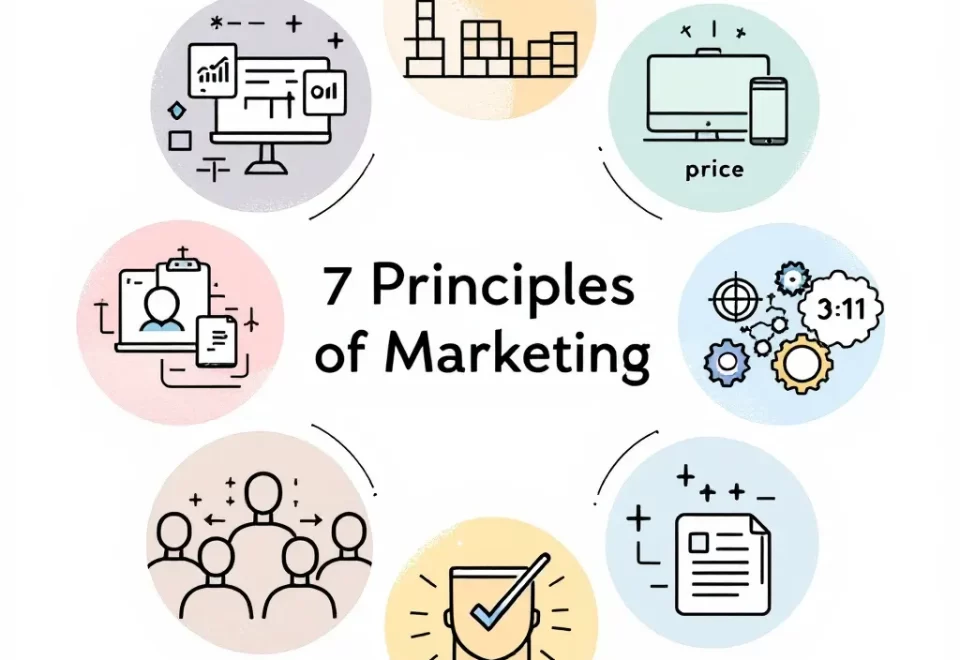Some basics simply cannot be overlooked whether you’re just starting in the marketing field or have been extensively doing it for years. These seven fundamentals must be considered and practiced regularly in handling your marketing strategies to get your mark on the world. We’ll dive deep into these tactics, which range from understanding who your customer is to proving ROI across campaigns and outlining what success looks like—all components necessary for a successful venture. If you want to ensure your efforts produce meaningful results, read on!
Why Should You Pay Attention to Marketing Fundamentals?
Before we dive into the seven marketing fundamentals, it is important to understand why they are essential.
The first and foremost benefit of paying attention to marketing fundamentals is knowing who your customers are. Understanding their needs and desires can help you tailor your product or service to suit them better. Knowing what they look for in a brand, how they engage with it, and why they choose one over the other can be vital for success. Suppose you have a great idea for a product or service, but you don’t know who your target market or customers are – it can be very difficult to get traction without knowing this information.
Another important benefit of paying attention to marketing fundamentals is understanding your competition. Knowing your competitors’ strategies, products, or services and where you have a competitive advantage can be extremely useful. Additionally, understanding your competitors can help you innovate and create even better solutions that meet customers’ needs in more ways than one. With this knowledge, you can compete with them effectively and gain market share.
Another benefit of paying attention to marketing fundamentals is leveraging data. With data-driven insights, you can understand customer behavior better and make decisions based on facts rather than assumptions. You can also use data to understand market trends and identify new growth opportunities. Finally, using data allows marketers to measure their performance and ensure campaigns achieve the desired results. This helps to optimize marketing efforts for maximum efficiency and performance.
Considering all of these benefits, it is easy to see why it is important to pay attention to marketing fundamentals. These strategies provide an invaluable foundation upon which successful marketing campaigns and business growth plans can be built. Understanding these principles is essential to being a successful marketer, so don’t overlook them!
7 Essential Marketing Fundamentals You Cannot Overlook
Now that we have established the importance of paying attention to marketing fundamentals let’s look at these seven essential principles of marketing perspective.
1. Define Your Target Audience
The first step in creating a successful marketing campaign is understanding your target audience. Knowing exactly who you’re targeting with your message can help ensure that you focus your advertising efforts only on the right people and not waste any time or money on those who won’t be interested in what you have to offer.
This means taking the time to research and analyze your target audience to better understand their demographic characteristics, psychographic traits, interests, consumption habits, and purchasing preferences. To accurately target the right people, use surveys, market research, and focus groups to gain insight into the most important attributes of your potential customers. Once you understand who they are and what they want, you can craft an effective messaging strategy tailored specifically to them. In search engine optimization (SEO), Google and other search engine algorithms also use your audience’s metrics to deliver the most relevant content in search results.
Additionally, use analytics tools such as Google Analytics or social media insights to get a clearer picture of your current customer base so that you and your marketing team can better identify prime growth opportunities. For example, suppose you find that most current customers come from one particular region or age group. In that case, it’s likely worth devoting extra attention and resources to targeting those areas.
By understanding your target audience, you can create a marketing campaign that resonates with them and drives the highest return on investment. Ensure that you constantly refine your understanding of your customers so that your marketing aims and message remain relevant and effective in an ever-evolving marketplace.
2. Develop an Engaging Brand Identity
The second marketing fundamental you cannot overlook is developing a marketing concept and a strong brand identity. A well-crafted brand identity can help differentiate you from the competition and create an emotional connection with potential customers.
Your brand identity should include a logo, tagline, color palette, typography, tone of voice, and mission statement. These elements should evoke an emotional reaction from your target audience and help them to easily recognize and remember your brand. Different marketing concepts like content and influencer marketing are also important elements of an effective branding strategy.
When creating these elements, it is important to remember the values, characteristics, and ideas you want to be associated with your brand. You can also leverage customer feedback to gain insight into what resonates most with them. Once you have developed a unique identity for your brand, make sure it is consistent across all of your marketing channels so that customers can quickly identify who you are and what you offer, no matter where they come across your company name or message.
Looking to build a strong marketing foundation for your business?
Contact Growth Hackers
3. Utilize Multiple Channels
The third principle of successful marketing is utilizing multiple channels. This means creating a strategic marketing plan for how you are going to reach your target audience and making sure that they have the opportunity to interact with your brand in various ways.
Your strategy should include online and offline channels, such as social media marketing, pay-per-click advertising, email marketing and campaigns, print materials, direct mailers, and radio or television spots. Depending on the type of product or service you are selling and the size of your budget, you can mix and match these channels to create a comprehensive approach to reaching potential customers.
For example, if you’re targeting a younger demographic who spends more time online, you can focus more on your social media presence and digital advertising. However, if the goal is to reach a more established audience, you may want to invest in traditional methods such as television and radio spots or direct mailers.
Regardless of which channels or marketing mix you choose, it’s important to track your campaigns and measure their success so that you can make adjustments accordingly. By taking an omnichannel approach to the market, you will be better positioned to maximize your reach and solidify your brand in the minds of potential customers.
4. Invest in Your Brand
One of the most important marketing fundamentals is investing in your brand. Your brand is one of your most valuable assets, as it conveys to customers who you are, what you stand for, and why they should choose you over other options.
To effectively convey your brand’s messages, it’s important to ensure that your branding is consistent across all platforms and channels – from websites and social media pages to print materials and television spots. Investing in custom photography or videography can help bring your messaging to life and give customers a better understanding of what sets you apart from the competition.
Finally, invest in customer service training so everyone in your organization is on the same page when authentically representing your brand. Your team should feel empowered to go above and beyond to ensure customers have a positive experience with your company. With the right training and resources, you can create a memorable customer experience that will help drive loyalty and advocacy for your brand.
5. Foster Relationships
Building customer relationships is essential to create long-term customer loyalty and revenue. It’s important to understand the needs of consumers in your target audience so that you can tailor your messaging and customer experience accordingly.
Personalizing customer interactions is key, allowing them to feel like you value their business. This can include sending personalized emails, offering discounts or rewards for repeat customers, and providing outstanding customer service.
You should also contact customers regularly via email newsletters, social media updates, or direct mailers. By doing so, you remind them that they’re part of the community and that you appreciate their support. You can even send surveys to gain valuable insights into what customers are looking for and use this information to optimize your campaigns and marketing strategies.
Word-of-mouth marketing can also be a great way to build relationships with customers. Whether through customer referrals or reviews, this type of marketing and communication can help you engage with existing customers and reach new ones.
By fostering strong relationships with your customers, you create an emotional connection that will keep them returning for more. Investing in relationship building can lead to higher customer satisfaction, more loyal customers, and improved ROI. Ultimately, investing in relationships with your customers is an integral part of achieving success as a business.
6. Utilize Automation
In the past, marketers had to rely on manual labor to conduct their campaigns and tasks. Fortunately, with the development of automation technology, marketing teams now have access to more efficient operating methods. Automation streamlines processes that can be done in minutes or hours instead of days or weeks. It increases productivity by freeing up time for marketers to focus on other activities and projects, such as creating content or designing campaigns. Additionally, it reduces human error and ensures consistency across multiple tasks and channels.
Automation has become increasingly commonplace in sales and marketing departments due to its ability to cut costs by reducing manual labor needs and allowing for better analysis of data points gathered from different sources. By leveraging automation tools like customer relationship management (CRM) systems and marketing automation platforms, marketers can quickly segment customers into smaller groups based on their behaviors. This enables them to send more targeted messages and create personalized experiences for each customer.
Moreover, automation allows marketers to track metrics such as impressions, clicks, page views, bounce rates, and conversions in real time. With this data, they can understand which campaigns are working best so they can focus their efforts on those that generate the greatest ROI. Automation also helps marketers stay organized by allowing them to set up automated tasks like email sequences and scheduled posts according to a predetermined plan.
Automation is an essential component of modern marketing strategies that cannot be overlooked if businesses want to remain competitive in today’s digital landscape. By utilizing automation tools, marketers can maximize their efficiency and improve the quality of their campaigns. This will help companies ensure that their efforts successfully drive customer engagement and generate revenue for the business.
Now is the time to apply the marketing fundamentals to your company!
7. Don’t Forget to Test
Testing is an essential part of any successful marketing strategy. Online growth experiments allow marketers to discover what works and what doesn’t and identify areas for improvement. Testing can be done on anything from copywriting, images, videos, and landing pages to email campaigns, social media posts, and more.
A/B testing is a type of experiment in which two versions of the same item are compared against each other to determine which performs better. For example, an A/B test could involve creating two different versions of a landing page to measure which one yields higher conversion rates. Another type of test is multivariate testing, where multiple elements on the same page are changed simultaneously to identify the best combination.
Testing should be part of any campaign or strategy launch process, allowing marketers to validate assumptions and change accordingly. It also helps assess customer preferences, allowing marketers to tailor content to user needs and interests. Testing also ensures campaigns reach their full potential by optimizing results based on data-driven insights.
Marketers should clearly define their goals and objectives to ensure testing is successful before beginning the marketing process. It’s also important to prioritize which tests are most important so that time and resources can be allocated accordingly. Once testing has been completed, it’s essential to evaluate the results to determine what worked, how it could have been improved, and how it can be implemented.
Closing Thoughts About Marketing Fundamentals
When it comes to marketing, these seven key fundamentals should never be overlooked. Marketers must define their goals and objectives, create meaningful content, develop a strong presence on all social media platforms, use suitable analytics tools and metrics, optimize for search engines using digital marketing tools and techniques, utilize email campaigns effectively, and don’t forget to test! Testing allows marketers to discover what works best and identify areas for improvement by validating assumptions based on data-driven insights.
By focusing on these basic principles of marketing success, businesses can maximize their potential and increase the reach of their message. Through careful planning and execution of strategies with the right tactics in mind, businesses can ensure they make informed decisions about their campaigns and marketing considerations that will ultimately lead to greater success. To assist marketers, plenty of online resources are available to provide support and guidance on implementing the best practices for each fundamental.
So, don’t forget to apply the seven marketing fundamentals – it can make all the difference for your business. Staying focused on these essential strategies will help ensure your brand is visible and you can reach maximum success in your campaigns. Utilize these tips, and you’ll stay ahead of the competition! Good luck!
Growth Hackers is a full-service inbound marketing agency helping businesses from all over the world grow. There is no fluff with Growth Hackers. We help entrepreneurs and business owners apply the marketing fundamentals, increase their productivity, generate qualified leads, optimize their conversion rate, gather and analyze data analytics, acquire and retain users and increase sales. We go further than brand awareness and exposure. We make sure that the strategies we implement move the needle so your business grow, strive and succeed. If you too want your business to reach new heights, contact Growth Hackers today so we can discuss about your brand and create a custom growth plan for you. You’re just one click away to skyrocket your business.









